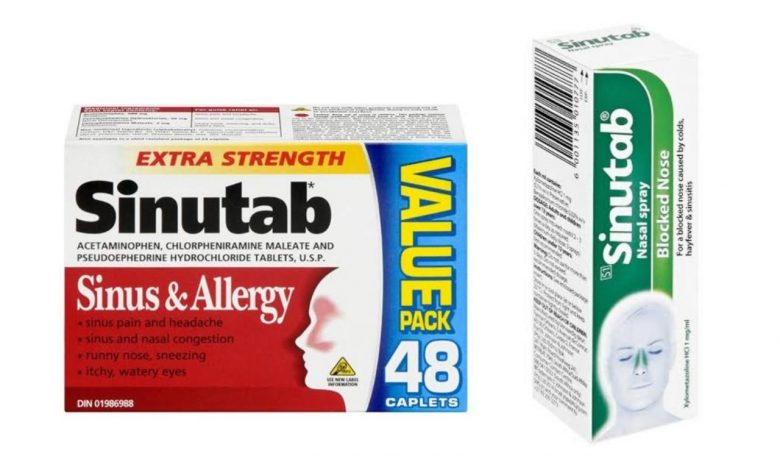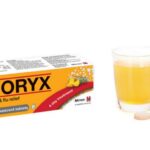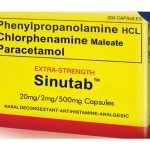Sinutab Tablet and Spray: Ingredients, Uses, Dosage, Side Effects

Sinutab tablet is a combination medication used to temporarily treat symptoms caused by the common cold, flu, allergies, or other breathing illnesses (such as sinusitis, bronchitis).
Sinutab was originally marketed by Warner–Lambert. It is manufactured and distributed by Johnson & Johnson after its acquisition of Pfizer’s consumer healthcare division in late December 2006. It is packaged as white, round, biconvex, uncoated tablets, with each tablet containing 30 mg of pseudoephedrine hydrochloride (PSE), 500 mg of paracetamol (acetaminophen), and 2 mg of chlorpheniramine maleate (CPM) as the active ingredients.
Sinutab also comes as a nasal spray that unblocks the nose, relieving the pressure and clearing your head cold. Sinutab Nasal Spray contains Xylometazoline Hydrochloride 1 mg per ml (0,1% w/v).
How is Sinutab tablet used?
Use Sinutab tablets exactly as directed on the label, or as prescribed by your doctor. Do not use in larger or smaller amounts or for longer than recommended. This medicine is usually taken only for a short time until your symptoms clear up.
Do not take more of the Sinutab tablet than is recommended. An overdose of acetaminophen can damage your liver or cause death. Do not give this medication to a child younger than 4 years old. Always ask a doctor before giving a cough or cold medicine to a child. Death can occur from the misuse of cough and cold medicines in very young children.
Do not take for longer than 7 days in a row. Call your doctor if your symptoms do not improve after 7 days of treatment, if you still have a fever after 3 days, or if you have a fever with a headache, cough, or skin rash.
If you need surgery or medical tests, tell the surgeon or doctor ahead of time if you have taken this medicine within the past few days.
Store at room temperature away from moisture and heat. Do not allow the liquid medicine to freeze.
What happens if I miss a dose of Sinutab tablet?
Since Sinutab is taken when needed, you may not be on a dosing schedule. If you are taking the medication regularly, take the missed dose as soon as you remember. Skip the missed dose if it is almost time for your next scheduled dose. Do not take extra medicine to make up for the missed dose.
What happens if I overdose?
Seek emergency medical attention or call the Poison Help line at 1 800 222 1222. An overdose of acetaminophen can be fatal.
The first signs of paracetamol overdose include loss of appetite, nausea, vomiting, stomach pain, sweating, and confusion or weakness. Later symptoms may include pain in your upper stomach, dark urine, and yellowing of your skin or the whites of your eyes.
How is Sinutab nasal spray used?
Dosage: Infants and children under the age of 2 years: As required, spray once into each nostril several times a day.
Children over the age of 2 years and adults: As required, spray once to twice into each nostril several times a day.
What happens if I miss a dose of Sinutab nasal spray?
Use the missed dose as soon as you remember. Skip the missed dose if it is almost time for your next scheduled dose. Do not use extra medicine to make up for the missed dose.
What happens if I overdose on Sinutab nasal spray?
An overdose of Sinutab nasal spray is not expected to be dangerous. Seek emergency medical attention or call the Poison Help line at 1-800-222-1222 if anyone has accidentally swallowed the medication.
How long can I use Sinutab nasal spray?
Sinutab nasal spray contains a decongestant Xylometazoline that should only be used for a few days otherwise one can develop a rebound condition called Rhinitis Medicaments.
Side Effects of Sinutab Tablets
Get emergency medical help if you have signs of an allergic reaction: hives; difficulty breathing; swelling of your face, lips, tongue, or throat.
In rare cases, acetaminophen may cause a severe skin reaction that can be fatal. This could occur even if you have taken acetaminophen in the past and had no reaction. Stop taking this medicine and call your doctor right away if you have skin redness or a rash that spreads and causes blistering and peeling. If you have this type of reaction, you should never again take any medicine that contains acetaminophen.
Stop using this medicine and call your doctor at once if you have:
• chest pain, rapid pulse, fast or uneven heart rate;
• confusion, hallucinations, severe nervousness;
• tremor, seizure (convulsions);
• easy bruising or bleeding, unusual weakness;
• little or no urinating;
• nausea, pain in your upper stomach, itching, loss of appetite, dark urine, clay-colored stools, jaundice (yellowing of your skin or eyes); or
• dangerously high blood pressure (severe headache, blurred vision, buzzing in your ears, anxiety, chest pain, shortness of breath, uneven heartbeats, seizure).
Side effects such as dry mouth, constipation, and confusion may be more likely in older adults.
Common side effects may include:
• dizziness, drowsiness;
• mild headache, blurred vision;
• dry mouth, nose, or throat;
• constipation;
• feeling nervous; or
• sleep problems (insomnia).
This is not a complete list of side effects and others may occur. Call your doctor for medical advice about side effects. You may report side effects to FDA at 1-800-FDA-1088.
Side Effects of Sinutab Spray
Get emergency medical help if you have signs of an allergic reaction: hives; difficult breathing; swelling of your face, lips, tongue, or throat.
Although the risk of serious side effects is low when Sinutab nasal spray is used in the nose, side effects can occur if the medicine is absorbed into your bloodstream.
Stop using this medicine and call your doctor at once if you have:
• blurred vision;
• headache, dizziness, nervousness;
• fast or pounding heartbeats;
• a light-headed feeling, like you might pass out;
• wheezing, feeling short of breath; or
• worsening symptoms.
Common side effects may include:
• dryness, burning, or stinging inside your nose;
• sneezing; or
• runny nose.
This is not a complete list of side effects and others may occur. Call your doctor for medical advice about side effects. You may report side effects to FDA at 1-800-FDA-1088.
Can I take Sinutab and antihistamine?
No, Sinutab tablets already contain chlorpheniramine an antihistamine used to relieve symptoms of allergy, hay fever, and the common cold. Taking another antihistamine might result in an overdose.





